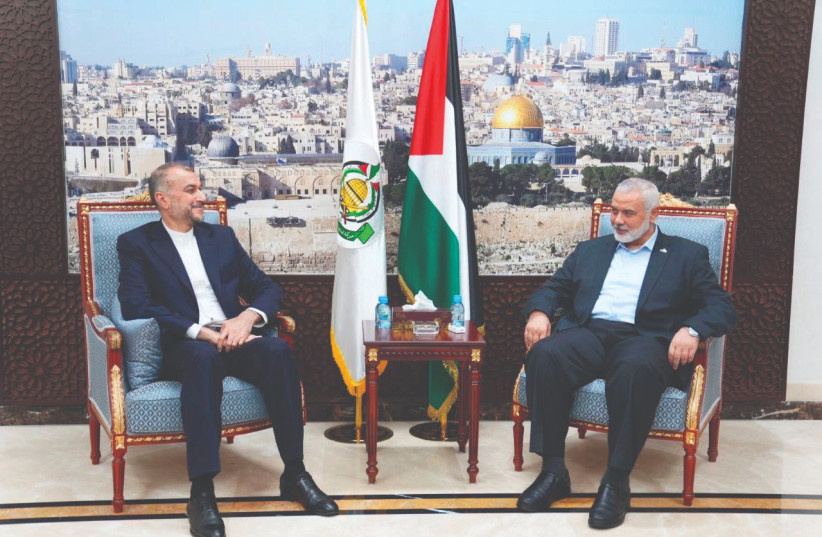Israel-Hamas war: Haniyeh visits Egypt amid intensive ceasefire talks
The leader of Hamas made his first visit to Egypt for more than a month on Wednesday, a rare personal intervention in diplomacy amid what a source described as intensive talks on a new ceasefire to let aid reach Gaza and get hostages freed.
Hamas leader Ismail Haniyeh, who normally resides in Qatar, typically intervenes in diplomacy publicly only when progress seems likely. He last traveled to Egypt in early November before the announcement of the only agreement on a ceasefire in the war so far, a week-long pause during which more than 100 hostages were released.
A source briefed on negotiations said envoys were discussing which of the hostages still held by terrorists in Gaza could be freed under a new truce agreement and what prisoners Israel might release in return.
Israel was insisting that all remaining women and infirm men among hostages be released, the source said, declining to be identified. Palestinians convicted of serious offenses could be on the list of prisoners to be freed.
The source described the negotiations as intensive and said a breakthrough could be possible within days.

A Palestinian official said Haniyeh was keen to listen to Egyptian officials for a possible new approach and noted that the official position of Hamas was to reject any new temporary ceasefire and demand a permanent halt to fighting.
“Hamas’s stance remains they don’t have a desire for humanitarian pauses. Hamas wants a complete end to the Israeli war on Gaza,” the Palestinian official said.
“Haniyeh and Hamas always appreciate the Egyptian effort. He is in Cairo today to listen to whether Israel has made new proposals or whether Cairo has some too. It is early to speak of expectations.”
A senior Israeli official repeated the government position that the war could end only with the release of all hostages and the destruction of Hamas: “As the prime minister has said, the war will end with total victory.”
The negotiations come as Israel has faced increasing pressure from its international allies to curb a campaign in Gaza that has laid waste to much of the coastal enclave in retaliation for a Hamas killing spree on Oct. 7.
Washington, Israel’s closest ally, has publicly called over the past week for it to scale down its all-out war into a more targeted campaign against Hamas leaders and end what US President Joe Biden called “indiscriminate bombing.”
UN vote delayed
At the UN Security Council, where Washington has twice used its veto to shield Israel from international demands for a ceasefire, negotiators put off a vote on the latest resolution for another day in hope of reaching an agreed text.
When asked if they were getting close to an agreement, US Ambassador to the UN Linda Thomas-Greenfield told reporters on Tuesday: “We’re trying, we really are.”
Since the last truce collapsed at the start of this month, the war has entered a more intensive phase, with ground combat previously confined to the northern half of the Gaza Strip now spread across the length of the coastal enclave.
Israel has sworn to defeat Hamas, which rules Gaza, since its fighters killed 1,200 people and captured 240 hostages in the Oct. 7 attacks. Gaza health officials say nearly 20,000 people have since been confirmed killed in Israeli strikes, with thousands more believed lost and buried under rubble.
Israel’s government has faced domestic political pressure to reach a further agreement to free hostages, especially after acknowledging last week that troops mistakenly killed three of those taken. Israel believes 129 hostages remain in Gaza, of whom 21 are feared to have died in captivity.
In the north, where Israeli forces claimed to have achieved most of their military objectives last month, fighting has been more intense than ever. Huge orange balls of flame and towers of black smoke soared into the sky over the northern Gaza Strip as seen from across the fence in Israel, as Israeli warplanes pounded the area at dawn.
The Palestinian Red Crescent said Israeli forces had besieged its ambulance depot in Jabalia, a northern settlement that has been the site of some of the most intensive fighting. There are 127 people in the facility, including workers, displaced people and wounded.
In the south, where most of Gaza’s residents are now sheltering after fleeing other areas, there has been intense fighting around the center of the main southern city Khan Younis, which Israeli forces have partly stormed.
“All the night bombing didn’t stop. Their focus now is Khan Younis. People here have to deal with two wars all the time, bombing and hunger,” said Samir Ali, 45, a father of five from Gaza City in the north now sheltering in Khan Younis.
Israel says it is doing what it can to protect civilians, including warning them in advance of strikes, and blames Hamas for harm to them for operating in their midst, which Hamas denies.
International aid organizations say the enclave’s 2.3 million residents have been driven to the brink of catastrophe by destruction that has forced 90% of them from their homes and a blockade restricting access to food and medical supplies.





Comments are closed.